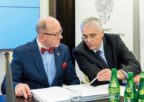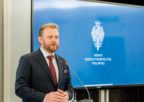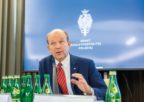“Health First” Program is an initiative of Prof. Henryk Skarżyński launched in 2016 and implemented on an increasingly large scale. The third edition of the Program began in June at the Polish Television building and the building of Polish Radio and lasted throughout the summer until mid-October. The summary of the results of the action took place on October 17 in the Senate of the Republic of Poland during the “round table” with the participation of experts from various fields of medicine supporting the Program. In the debate, moderated by Prof. Henryk Skarżyński and Krzysztof Jakubiak, Director of the Press and Promotion Office at the Ministry of Health, Stanisław Karczewski, Speaker of the Polish Senate, Waldemar Kraska, Chairman of the Senate Health Commission, Łukasz Szumowski, Minister of Health, and Senator Konstanty Radziwiłł, Minister of Health in 2015-2018.
The conference participants were greeted by Waldemar Kraska, Chairman of the Senate Health Commission. In his speech, he pointed out that diseases of affluence, which are favored by a sedentary lifestyle, irrational diet and stress, are one of the biggest problems in developed countries. The “round table” discussion devoted to the prevention of such diseases was officially opened by the host – the Speaker of the Polish Senate Stanisław Karczewski. Thanking to Prof. Henryk Skarżyński for cooperation in the organization of three conferences devoted to health in the Senate of the Republic of Poland, he emphasized that health protection is an area where a lot of work is still to be done. – The fact that you accepted the invitation to today’s debate – said the Senate Speaker Karczewski, addressing a group of experts – means that we care about the health of the Poles. Prophylaxis – as he emphasized – is a topic that should appear in everyday conversations. The message given to children and young people is especially important. Inculcating them with healthy habits about nutrition or physical activity is an investment in the future of our society. – Let’s encourage to healthy behavior – appealed the Senate Speaker Karczewski, stressing that such an incentive may also come from politicians. – Last year, together with the Minister of Health, we got vaccinated against influenza. Thus, we were exposed to hate, because – as you know – there is anti-vaccination movement.
– I do not forget that I am a doctor, and I am very keen on speaking about prevention as much as possible – added the Senate Speaker Karczewski, encouraging journalists present in the room to take up health-related topics as often as possible – which has recently been recognized as one of the priorities also by the Prime Minister Mateusz Morawiecki.
If a person wants to be healthy, even medicine is powerless, joked Prof. Łukasz Szumowski, the Minister of Health, to welcome the participants of the debate. With reference to this joke, he cited European data, indicating that pro-health activities affect the prolongation of life in as much as 70%, while medicine – only in 30%. There is no doubt, therefore, that the greatest emphasis should be put on prophylaxis. Unfortunately – stressed Prof. Szumowski – most prophylactic programs do not work as we would expect. There is also a conflict of ethics and health economics – expenditures on preventive activities bring benefits, but only after some time, while the money for healing the sick is needed here and now. So where should the financial resources go for? – It is impossible to decide which activities are more important – said Prof. Szumowski. – However, if we do not act in both these areas, we will not be able to cope with diseases of affluence, especially with current demographic changes, as well as growing health problems typical of Western countries, such as obesity, which is more and more common in children.
– Pro-health activities are a concern for all ministries, including ministry of the family, technology, finances – emphasized Minister Szumowski during his speech. – But also an issue for all of us. If preventive measures are not based on upbringing, if we do not implement pro-health education in schools and families, we will not succeed.
This discussion thread was picked up by Prof. Henryk Skarżyński, when opening the “round table” debate. He emphasized that one of the objectives of the “Health First” Program launched three years ago was to build intergenerational solidarity, without which, especially in an aging society, it is difficult to ensure an efficient health and social care system. – By building such solidarity, we build a future for ourselves – said Prof. Skarżyński.
At the beginning of the discussion devoted to the challenges in the prevention of diseases most often affecting the Polish population Prof. Skarżyński summarized the effects of this year’s edition of the “Health First” Program. – It was the longest tour of screening tests – emphasized Professor. An interdisciplinary team of specialists travelled 34 times throughout Poland, visiting cities, towns and municipalities in the whole country and covering many thousands of kilometers. In addition to otolaryngologists, audiologists, phoniatrists from the IFPS World Hearing Center and the Institute of Sensory Organs, specialists from other fields of medicine – periodontics, ophthalmology, cardiology, dermatology, oncology, urology, hematology, surgery, maxillofacial surgery, pediatrics, psychiatry, psychology, speech therapy, gastroenterology and dietetics also took part in the Program. The program involved a total of tens of thousands of people – in addition to patients who underwent tests and consultations, their relatives and friends also visited medical towns. Interested passers-by could also join in. At the information stands, there were available materials and leaflets promoting the principles of aural hygiene and a healthy lifestyle.
“Health First” Program does not only mean consultations, advice and research throughout the country. It is also an extensive promotional and educational campaign, involving patients who can be considered ambassadors of successes in medicine. One of the most important events within the Program taking place with the participation of patients was the International Music Festival for Children, Youth and Adults with Hearing Disorders “Beats of Cochlea”, organized for the fourth time on the initiative of Prof. Skarżyński under the honorary patronage of the Minister of Health. The Festival was accompanied by a scientific conference from the series “Music in Human Auditory Development”.
– We promoted the idea of the Program on the largest Polish forums, congresses as well as business and economic debates, including the Economic Forum in Krynica, Wellconomy Forum in Toruń, Congress of Health Challenges in Katowice, Baltic Business Forum in Świnoujście and Congress 590 in Rzeszów, trying to show Polish medicine from its best perspective – emphasized Prof. Skarżyński.
The strength of the “Health First” Program is a wide-ranging media campaign, in which journalists from Polish Television, Polish Radio, as well as press and internet portals were involved. – We followed with cameras medical towns everywhere they were organized. Our journalists, encouraging to do the tests or consultations, talked not only with doctors but also with patients. Viewers listen to experts, but they identify with those who undergo the tests. The message conveyed by them is more emotional, it reaches the viewer more directly. It gives a better chance of reaching the viewer with valuable information on preventive examinations or recommendations on healthy eating, lifestyle, etc. – said the broadcast journalist Agnieszka Rosłoniak-Jeżowska from Polish Television, stressing that this year Polish TV showed a spot on the “Health First” Program for the first time.
– Polish Radio has been involved in the Program since the very beginning – said the radio editor Henryk Szrubarz. – Thousands of Poles benefited from consultations conducted under this Program. This allows us to believe that people, informed about the dangers of civilization diseases and encouraged to take care of their health, are able to take care of themselves – emphasized Mr. Szrubarz.
The contribution of the media to the Program promotion has been appreciated by many experts invited to the “round table” debate. – This is an extraordinary event in the public health sector – said Prof. Bolesław Samoliński, pointing out that owing to cooperation with the media that encouraged Poles to participate in tests, the effects of the Program are so good. – Prevention is a collective effort for health – summarized Prof. Samoliński.
During the “round table” discussions, however, not only the advantages of the Program and the successes of medicine were discussed, but above all the challenges for early diagnosis and treatment of diseases that pose the biggest risk for life and health of Poles and how to improve the health care system in Poland. Among others, Senator Konstanty Radziwiłł voiced his position. He emphasized that many tests currently available (for example, cytology, mammography or dermatoscopy of skin lesions), can be used for early detection of dangerous diseases. However, many people do not take this opportunity. How to change this situation? There are various proposals – from discussion to punishment. Finding a way to persuade patients to perform preventive examinations is not only a task for medicine, but also for other disciplines. As Senator Radziwiłł recapitulated, two directions of actions emerge from the discussion: education and dissemination of knowledge about pro-health prophylaxis and early detection, also through screening programs for selected diseases.
Conclusions from the “round table” – announced Minister Szumowski – will be forwarded to the Ministry of Health and will be used to develop the state health policy.
During the round table debate in the Senate of the Republic of Poland, prominent experts – specialists in various fields of medicine supporting “Health First” Program paid attention to the biggest problems related to prevention, early detection of diseases and treatment of the Poles. Below are the summaries of their speeches.
Dr n. med. Katarzyna Becker – orthodontist
 The teeth of Poles, both adults and children, are in a dramatic condition. There is a lack of public education in the matter of caring for oral health, and there are no effective measures to stop the epidemic of caries that has been present in Poland for 20 years. Caries, the consequence of which may be inflammation and malocclusion, occurs as much as in 90% of 7-year old children. Campaigns such as “” Health First “” or “Future without Caries” are a drop in the ocean of needs. As part of the prevention of caries, “Pod Szyndzielnia” Polyclinic in Bielsko-Biała has tested 30,000 children. The staff also examined over 1200 children using the Sensory Organs Research Platform.
The teeth of Poles, both adults and children, are in a dramatic condition. There is a lack of public education in the matter of caring for oral health, and there are no effective measures to stop the epidemic of caries that has been present in Poland for 20 years. Caries, the consequence of which may be inflammation and malocclusion, occurs as much as in 90% of 7-year old children. Campaigns such as “” Health First “” or “Future without Caries” are a drop in the ocean of needs. As part of the prevention of caries, “Pod Szyndzielnia” Polyclinic in Bielsko-Biała has tested 30,000 children. The staff also examined over 1200 children using the Sensory Organs Research Platform.
Prof. Renata Górska – periodontist
 There is a great need to make it clear that hygienic and dental negligence can adversely affect overall health. The data is striking – as much as 7% of Poles do not brush their teeth, and 25% only brush them once a day. As part of the “Health First” Program, we tested 2,000 Poles. The knowledge derived from these studies is invaluable. In addition, the participation of periodontists in the Program was an opportunity to educate patients. Most of them, especially residents of small towns, do not have access to a periodontist. There are only 500 doctors of this specialization in Poland, of which only 120 have a contract with the National Healthcare Fund.
There is a great need to make it clear that hygienic and dental negligence can adversely affect overall health. The data is striking – as much as 7% of Poles do not brush their teeth, and 25% only brush them once a day. As part of the “Health First” Program, we tested 2,000 Poles. The knowledge derived from these studies is invaluable. In addition, the participation of periodontists in the Program was an opportunity to educate patients. Most of them, especially residents of small towns, do not have access to a periodontist. There are only 500 doctors of this specialization in Poland, of which only 120 have a contract with the National Healthcare Fund.
Prof. Iwona Grabska-Liberek – ophthalmologist
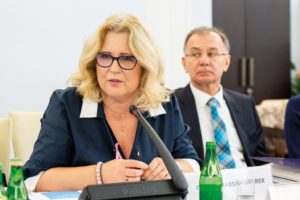 In Poland, a national program for the detection of visual impairments in children should be established. Short-sightedness, caused by prolonged exposure to artificial lighting, is currently taking on the dimension of an epidemic that affects small patients. The progress of this defect can be inhibited, provided it is detected. Therefore, screening tests for myopia are so important.
In Poland, a national program for the detection of visual impairments in children should be established. Short-sightedness, caused by prolonged exposure to artificial lighting, is currently taking on the dimension of an epidemic that affects small patients. The progress of this defect can be inhibited, provided it is detected. Therefore, screening tests for myopia are so important.
Prophylaxis in the field of eye diseases is part of pediatrics as well as in geriatrics. In the oldest generation, the problem is macular degeneration. Despite the treatment program, many people lose their sight. In addition to treatment, eye rehabilitation is important.
Prof. Teresa Jackowska – pediatrician
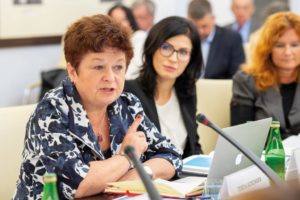 In Poland, the death rate of newborns has decreased, while problems related to the treatment of pediatric patients, including infants and adolescents, have not been resolved. Not in all areas of the country, the level of primary care, in district hospitals or clinics, is the same. With regard to the prevention of diseases in children, it is important to prevent obesity and depression. Currently, more children die in Poland due to suicide than cancer. Therefore, it is necessary to create a pediatric care system taking into account psychological counselling.
In Poland, the death rate of newborns has decreased, while problems related to the treatment of pediatric patients, including infants and adolescents, have not been resolved. Not in all areas of the country, the level of primary care, in district hospitals or clinics, is the same. With regard to the prevention of diseases in children, it is important to prevent obesity and depression. Currently, more children die in Poland due to suicide than cancer. Therefore, it is necessary to create a pediatric care system taking into account psychological counselling.
Prof. Mirosław Jarosz – gastrologist
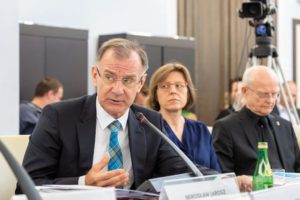 The name “Health First” Program goes hand in hand with the slogan “Healthy Food Pyramid and Physical Activity First”. The Institute of Food and Nutrition (IFN) collected evidence about the good effects of prevention and education. According to the estimates of the IFN, as a result of changing the diet for healthier, more than 300,000 Polish women and men avoided developing cancer. The IFN has launched the National Center for Nutritional Education” with a slogan “Take a Grip on Your Health.” It has many tools at its disposal that allow every Pole to learn about a healthy diet and actually control their own health.
The name “Health First” Program goes hand in hand with the slogan “Healthy Food Pyramid and Physical Activity First”. The Institute of Food and Nutrition (IFN) collected evidence about the good effects of prevention and education. According to the estimates of the IFN, as a result of changing the diet for healthier, more than 300,000 Polish women and men avoided developing cancer. The IFN has launched the National Center for Nutritional Education” with a slogan “Take a Grip on Your Health.” It has many tools at its disposal that allow every Pole to learn about a healthy diet and actually control their own health.
Prof. nadzw. Krzysztof Kochanek – Scientific Secretary of the IFPS
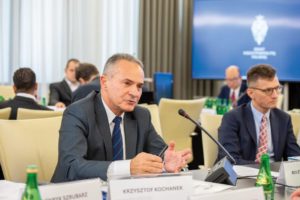 For 20 years, the IFPS has been implementing consecutive hearing screening programs for school children. These programs, including cooperation with the Farmers’ Social Insurance Fund and the Agricultural Social Insurance Fund, and the Office of the Capital City of Warsaw has already covered over one million of children. Based on previous experiences, the “Recommendations of the Polish Society of Otolaryngologists for Children and the Society of Polish Otorhinolaryngologists, Phoniatrists and Audiologists” regarding screening tests in children have been developed. The Institute is open for conducting such tests of other sensory organs disorders.
For 20 years, the IFPS has been implementing consecutive hearing screening programs for school children. These programs, including cooperation with the Farmers’ Social Insurance Fund and the Agricultural Social Insurance Fund, and the Office of the Capital City of Warsaw has already covered over one million of children. Based on previous experiences, the “Recommendations of the Polish Society of Otolaryngologists for Children and the Society of Polish Otorhinolaryngologists, Phoniatrists and Audiologists” regarding screening tests in children have been developed. The Institute is open for conducting such tests of other sensory organs disorders.
Prof. Ewa Lech-Marańda – hematologist
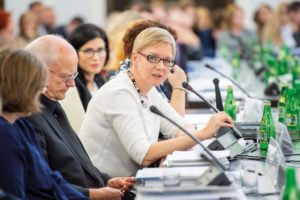 There are no recommendations for prophylactic or screening tests in hematological cancers. Many blood and bone marrow diseases, including cancers, can be detected through blood panel. Unfortunately, it was removed from the list of tests performed in occupational medicine. However, this simple test should be done at least once a year. An example of campaigns encouraging to perform a control morphology is “The Answer Is In the Blood”.
There are no recommendations for prophylactic or screening tests in hematological cancers. Many blood and bone marrow diseases, including cancers, can be detected through blood panel. Unfortunately, it was removed from the list of tests performed in occupational medicine. However, this simple test should be done at least once a year. An example of campaigns encouraging to perform a control morphology is “The Answer Is In the Blood”.
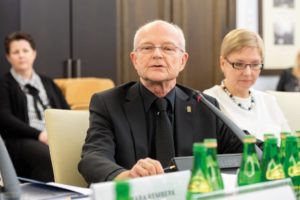 Dr n. med. Janusz Meder – oncologist
Dr n. med. Janusz Meder – oncologist
When we talk about preventing cancer, we’re also talking about preventing other diseases. The risk factors are the same. One should not, therefore, refer prophylaxis to particular specialties, but only talk about prevention of diseases of affluence. A healthy society means gaining money for the treatment of advanced diseases. Nowadays, it is necessary to coordinate pro-health programs, which have so far often had the character of “common uprising”.
Prof. Iwona Niedzielska – maxillofacial surgeon
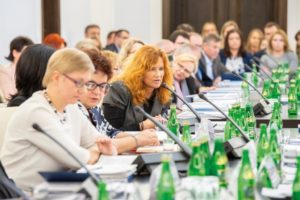 We can observe an increase in the incidence of oral cancer. The chance for early detection is provided by regular dental check-ups. Patients are not aware, however, that these are necessary. It may be necessary to introduce tools forcing dental control, e.g. loss of insurance if it is not performed. Unfortunately, during their studies dentists do not gain the knowledge necessary to diagnose oral cancer. There is a need to organize additional training courses for them.
We can observe an increase in the incidence of oral cancer. The chance for early detection is provided by regular dental check-ups. Patients are not aware, however, that these are necessary. It may be necessary to introduce tools forcing dental control, e.g. loss of insurance if it is not performed. Unfortunately, during their studies dentists do not gain the knowledge necessary to diagnose oral cancer. There is a need to organize additional training courses for them.
Prof. Grzegorz Opolski – cardiologist
 At this stage, the most important questions are: How to be effective? How to convey information about health prevention to Poles? It is also important to look for preventive programs that, being highly efficient, will not generate high costs. An important element is the coordination of preventive actions at the level of state authorities, districts and local governments.
At this stage, the most important questions are: How to be effective? How to convey information about health prevention to Poles? It is also important to look for preventive programs that, being highly efficient, will not generate high costs. An important element is the coordination of preventive actions at the level of state authorities, districts and local governments.
Dr hab. n. med. Jarosław Pinkas – Chief Sanitary Inspector
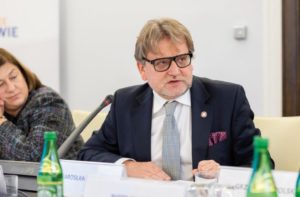 80% of diseases are our fault. Therefore, Poles should be persuaded that taking care of their health is their duty. Citizens must have a sense of such duty! In times when there are scarce authority figures, it is difficult to get the knowledge about prevention round. Many patients believe in the effectiveness of charlatan treatment. Some of them have 120,000 views on social media. Perhaps we should also promote prevention there.
80% of diseases are our fault. Therefore, Poles should be persuaded that taking care of their health is their duty. Citizens must have a sense of such duty! In times when there are scarce authority figures, it is difficult to get the knowledge about prevention round. Many patients believe in the effectiveness of charlatan treatment. Some of them have 120,000 views on social media. Perhaps we should also promote prevention there.
Dr hab. n. med. Robert Pudlo – psychiatrist
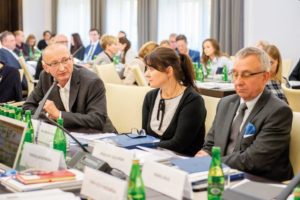 Attention should be paid to the need for psychiatry to help patients who are in the somatic diseases treatment departments. Poor mental state worsens the prognosis. By introducing screening tests for mental disorders in hospitals, we have a chance to improve the results of treatment. In addition, assistance from a psychiatrist during a stay in hospital not only increases the chance of successful therapy, but is also less stigmatizing.
Attention should be paid to the need for psychiatry to help patients who are in the somatic diseases treatment departments. Poor mental state worsens the prognosis. By introducing screening tests for mental disorders in hospitals, we have a chance to improve the results of treatment. In addition, assistance from a psychiatrist during a stay in hospital not only increases the chance of successful therapy, but is also less stigmatizing.
Dr hab. n. med. Barbara Remberk – children and youth psychiatrist
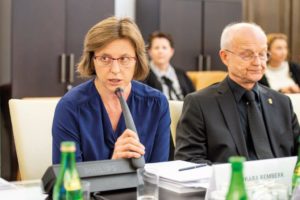 Since the “Flight over the Cuckoo’s Nest” movie, psychiatry has changed a lot, there are effective treatment methods. However, the psychiatric care system for children and youth is in a deep crisis. It lacks, among others a suicide prevention program that is the second leading cause of death among adolescents. Many children suffer from depression, whose symptoms remain unnoticed. Education is needed what to do when we suspect that a child suffers from depression.
Since the “Flight over the Cuckoo’s Nest” movie, psychiatry has changed a lot, there are effective treatment methods. However, the psychiatric care system for children and youth is in a deep crisis. It lacks, among others a suicide prevention program that is the second leading cause of death among adolescents. Many children suffer from depression, whose symptoms remain unnoticed. Education is needed what to do when we suspect that a child suffers from depression.
Prof. Bolesław Samoliński – allergist
 The incidence of allergies is increasing. Currently, almost half of the Polish population suffers from various types of allergic diseases. Allergies are not only a Polish problem – in recent times the percentage of cases in Europe has increased 40 times. There is no other disease that would occur as massively as allergy. One of its causes is pollution of the environment, which in Poland is one of the largest in Europe.
The incidence of allergies is increasing. Currently, almost half of the Polish population suffers from various types of allergic diseases. Allergies are not only a Polish problem – in recent times the percentage of cases in Europe has increased 40 times. There is no other disease that would occur as massively as allergy. One of its causes is pollution of the environment, which in Poland is one of the largest in Europe.
Prof. Piotr Socha – pediatrician, gastrologist
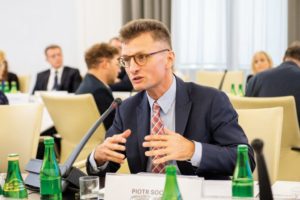 Scientific evidence is necessary to form recommendations for children. Evidence that developing healthy habits in childhood affects the health of an adult already exists. In Poland, as in other countries, obesity is a serious problem in children. In the prevention of obesity, screening plays an important role. It can also be used to detect rare diseases. This topic is worth discussing during the future debate. •
Scientific evidence is necessary to form recommendations for children. Evidence that developing healthy habits in childhood affects the health of an adult already exists. In Poland, as in other countries, obesity is a serious problem in children. In the prevention of obesity, screening plays an important role. It can also be used to detect rare diseases. This topic is worth discussing during the future debate. •






